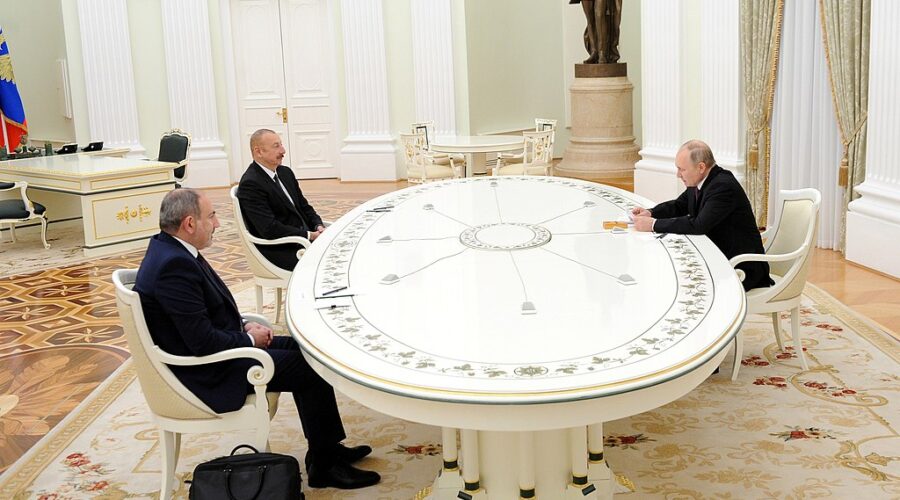The European Union seems to have replaced Russia as a major foreign power operating in the South Caucasus. While Moscow remains preoccupied with the Ukraine war, Brussels has managed to strengthen its role in the region that has traditionally been in the Kremlin’s sphere of influence.
Armenia and Azerbaijan – two archenemies that fought the 44-day war in 2020 – have agreed to a civilian EU mission alongside their border. The deal was reached after Azerbaijan’s President Ilham Aliyev, Armenia’s Prime Minister Nikol Pashinyan, France’s President Emmanuel Macron and European Council President Charles Michel, met in Prague on October 6 on the margins of the first gathering of the European Political Community. More importantly, according to the European Council, Yerevan and Baku have confirmed their commitment to the Charter of the United Nations and the Alma Ata 1991 Declaration through which both recognize each other’s territorial integrity and sovereignty.
In other words, Armenia has recognized that Nagorno-Karabakh is an integral part of Azerbaijan, which was Baku’s key demand during negotiations the two countries held over the past two years. Even though ethnic Armenians have a de facto control over the mountainous region, Yerevan is now expected to stop insisting on the status of Nagorno-Karabakh, and will likely focus on the rights of the local Armenians. But Azerbaijan, a clear winner of the 44-day war, will unlikely agree to grant any privileges to the Armenian population living in Nagorno-Karabakh.
“Armenians living in Karabakh are our citizens and we are not going to discuss their fate and future life with any country, including Armenia,” said Aliyev on October 7.
It is entirely possible that Yerevan hopes that the EU will eventually put pressure on Baku to make concessions to Armenia regarding the position of the Armenians in Nagorno-Karabakh. But given that Europe seeks to strengthen economic ties with Azerbaijan, and increase natural gas imports from the energy-rich country, it is not very probable that Brussels will openly side with Armenia over the Karabakh issue. However, the EU’s decision to dispatch a mission to the land-locked nation’s border with Azerbaijan could be interpreted as a signal that the bloc firmly supports Armenia’s territorial integrity, and will seek to ease tensions between the two neighbors following recent border clashes that resulted in over 200 deaths on both sides.
Indeed, it is in the EU’s best interest that Armenia and Azerbaijan normalize relations, and that Pashinyan and Aliyev sign a peace agreement as soon as possible. Moreover, from the European perspective, if a deal is signed in Brussels, it will be a clear sign that Russia can no longer count on a role of the regional arbiter, even though some 2,000 Russian troops have been deployed to Nagorno-Karabakh as a result of the Moscow-brokered ceasefire agreement signed in November 2020. But the very fact that Aliyev and Pashinyan travelled to the Russian capital on October 7 to participate in an informal summit of the Commonwealth of Independent States leaders, indicates that the Kremlin will continue struggling to preserve the role of a mediator in the South Caucasus.
What Moscow and Brussels have in common is that they both need stability in the region. The last thing that Russia wants is another war in its “near abroad” given that, under the current geopolitical circumstances, the Kremlin would unlikely be able to help its nominal ally Armenia, a member of the Russian-dominated Collective Security Treaty Organization. The EU, for its part, is interested not only in Azerbaijani energy, but also in transportation routes linking Europe and Asia via the South Caucasus. That is why the unblocking of transport corridors in the region has been on the agenda during all Brussels-brokered talks between Pashinyan and Aliyev.
The European Union could benefit from the construction of the Nakhchivan Corridor, also known as the Zangezur Corridor, linking mainland Azerbaijan, through the Armenian territory, with its exclave of Nakhchivan, and further with Turkey. Once completed, the Nakhchivan Corridor could ensure the development of the Middle Corridor, officially known as the Trans-Caspian International Transport Route, passing through Central Asia, the Caucasus, Turkey and Eastern Europe.
Russia also supports unblocking of transport communications in the South Caucasus. For Moscow, the Nakhchivan Corridor is important because it connects Russia with Armenia through Azerbaijani territory. Yerevan, however, fears that a new transportation route could have an impact on the country’s sovereignty, given that a land passage through the southernmost Armenian province Syunik would not include passport or customs controls. Thus, for Yerevan, the construction of the North-South corridor, linking Armenia with Russia through Georgia, seems to have a priority at this point, which is why both the EU and Russia may have a hard time pressuring the landlocked Caucasus country to start building its section of the Nakhchivan Corridor.
Sooner or later, however, Armenia and Azerbaijan will sign a peace deal and start a new chapter in their relations. Russia and the EU, on the other hand, will continue competing for influence in the South Caucasus.
Finally, the outcome of the Ukraine conflict will undoubtedly have a huge impact on the future of the strategically important region.
Image: Russian President Vladimir Putin, President of Azerbaijan Ilham Aliyev and Armenian Prime Minister Niкol Pashinyan in 2021 by President.az

